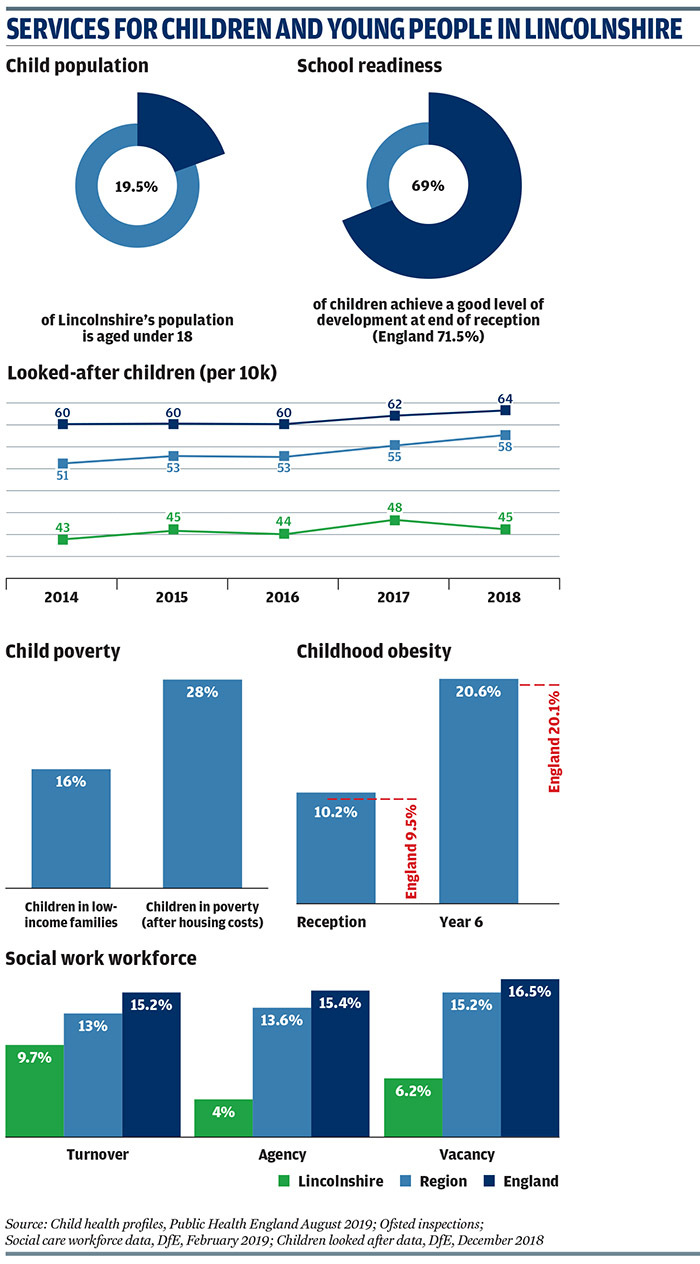Lincolnshire County Council: Local Spotlight
Derren Hayes
Monday, July 29, 2019
Stable workforce and good leadership help East Midlands council achieve 'outstanding' rating, but challenges are growing.

Lincolnshire children's services benefits from a stable, experienced and - as demonstrated by its recent "outstanding" Ofsted inspection - effective political and corporate leadership team.
Last year, long-standing director of children's services (DCS) Debbie Barnes was appointed interim head of paid service - the council's top officer - following the departure of Keith Ireland. This led to assistant director Janice Spencer, who has worked for the council since 1992, being appointed as interim DCS (see below).
Ofsted praised the departments' leaders for their work in maintaining high standards in children's services during a period of rising demand and reduced funding.
Inspectors were also particularly impressed with the council's "highly skilled workforce" and its "outstanding" service for children in care.
"Permanence and stability are achieved quickly for children who cannot live with their birth parents and there are high levels of multi-agency support to help them reach their full potential," the report says.
"An insightful, highly motivated and extremely child-centred senior leadership team has been relentless in its quest to improve the life experiences of, and chances for, children in the county."
Inspectors rated the council as outstanding across all areas except for the experiences and progress of children who need help and protection, which retained its previous "good" rating.
Workforce stability is a key factor in its success. The region tracks below the England-wide averages for social worker turnover, use of agency staff and vacancy rates, but Lincolnshire is a high performer regionally - it has the lowest agency rate, and second lowest vacancies and turnover in the East Midlands (see graphics).
The authority also compares favourably with its local neighbours and nationally when it comes to the number of children in care. Its looked-after child rate for 2017/18 was 45 per 10,000 children, nearly a third lower than the regional average. This rate fell from 48 per 10,000 in 2016/17, and as yet unpublished figures show there has been a further fall to 43 per 10,000 in 2018/19.
An inspection of special educational needs and disability services last year was also highly complementary about the quality of provision and the way health, care and education leaders had developed a joined-up system - a feat that has eluded many of the 101 areas inspected by Ofsted since 2016.
Lincolnshire is the second largest county in England with a population of 750,000. The civic capital is Lincoln.
The level of child poverty is below the national average, but the council rates of school readiness, young people not in education, employment or training, and childhood obesity are above national averages.
In addition to these growing socio-economic and health challenges, the council is also facing a strike by health visitors due to a dispute over terms and conditions since its transfer from the NHS in 2017.
Resolving the dispute to ensure it does not derail some of the progress is an immediate priority.

DCS VIEW
Early help focus and restorative social work practice key to success
By Janice Spencer, DCS, Lincolnshire County Council
There is a strong commitment to early help in children's services that has been backed with funding from the council through an "invest to save" ethos - this has been crucial to our success.
We have retained all 48 of our children's centres across the county and within those, six centres have maternity hubs with antenatal, health visiting, early help and social care delivery to enable children and families to access services in one place in the community.
We have locality teams comprising of social workers, early help workers and health visitors. There is a newly developed Future4Me service which incorporates our youth offending team, early help workers, psychologists, speech and language therapists and youth, community and sports development workers. They focus on supporting adolescents who are at risk of coming into care and/or entering the criminal justice system.
Health visitors and children's nurses transferred from the NHS to the local authority in October 2017 - at this time, we had the opportunity to develop an alternative to school nursing and, as a result, we commissioned our emotional health and wellbeing service Healthy Minds, which is delivered for all school-age children attending Lincolnshire schools.
Children, young people and families in Lincolnshire are helped to make changes for themselves, and the voice of the child in decision making and informing plans is strong.
Over the past three years, we have seen a steady reduction in our looked-after child population, the number of children subject to a child protection plan and the numbers of children in need. This is indicative of the strength of our early help offer and the implementation of Signs of Safety and restorative practice approaches.
Embedding Signs of Safety has been important to our vision. It has helped improve how we work with and empower them. It has helped our practitioners have restorative conversations with families in a way they can understand. One inspector said he'd been "blown away" by the quality of the direct work he'd seen over two days with our staff.
The impact that this is having with families can be seen in the reduction in care placements. Wherever it is safe and appropriate, we believe children should remain with their families, which is why we have a large number of children living with relatives through special guardianship or family fostering arrangements. It gives children stability.
There's been a stable leadership team in place here for a long time and the staff haven't felt the recent changes have impacted upon them. I've worked in every children's services office in the council and absolutely love working here. Having Debbie Barnes' knowledge and experience and being able to have a conversation with her about anything has been critical for me - there is a difference when you step up from an assistant to director position.
We truly value our staff, and keep caseloads low and support them with a retention payment to reduce the attraction of agency work.
Social workers are supported by managers and there is good supervision, while they say there is a clear career progression. They know that if they are worried about a child and they have done all they need to do, then I have every trust in their decision making.




